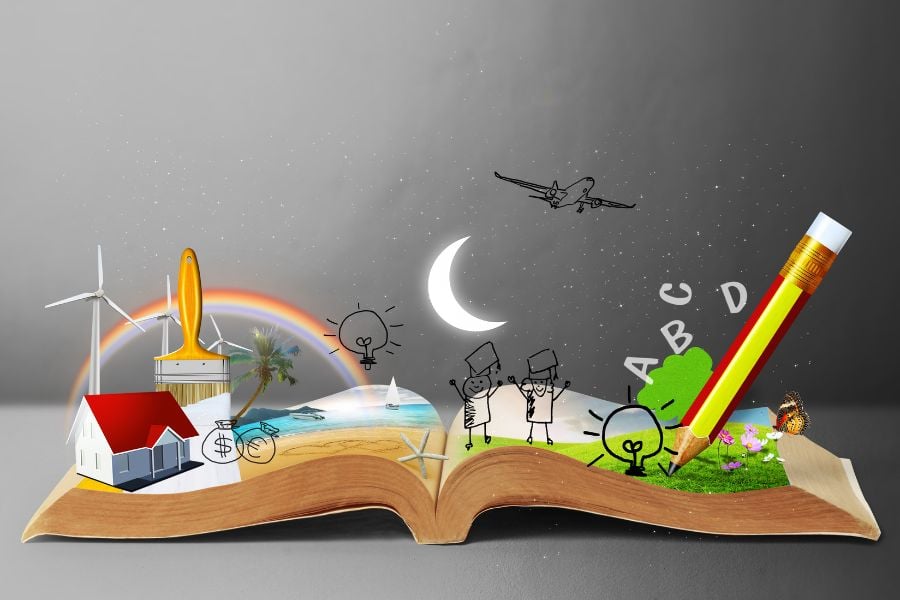As an avid reader of books and novels, books that aren’t novels, and novels that are books…(confused yet?), I’m here to help you set the record straight.
This article will explore how novels and books differ in their content, purpose, audience, and format.
By the time you’re done, you’ll not only get the basics down but also see how these differences really matter, whether you’re a reader or a writer looking to publish.
Let’s get to the bottom of this literary puzzle, shall we?

Book or Novel? Why Does it Matter?
Determining the difference between a book and a novel can indeed be important, depending on the context and your needs as a reader, writer, or literary enthusiast.
Here are a few reasons why this distinction might matter:
- Reader Expectation: As a reader, knowing whether you’re picking up a novel or a different type of book sets the right expectations. If you’re looking for an immersive story, you’ll lean towards a novel. But if you’re seeking information, learning material, or practical advice, you’ll likely choose a nonfiction book.
- Writing and Publishing: For writers and publishers, the distinction is crucial for targeting the right audience. A novel writer focuses on crafting engaging narratives and well-developed characters, while other book authors might concentrate on research, educational content, or factual accuracy. Publishers market and position these books differently based on their genre and type.
- Educational Purposes: In academic settings, distinguishing between novels and other books can be vital for curriculum design. Novels are often used for literature and language courses to teach narrative analysis, creative writing, and cultural studies, while textbooks and reference books serve different educational purposes.
- Cultural and Artistic Appreciation: For those interested in literature and culture, understanding the differences helps appreciate the art form. Novels are often seen as a reflection of society and human emotions, while other types of books might serve as historical records, instructional material, or philosophical works.
- Library and Bookstore Navigation: When searching for a book in a library or bookstore, knowing the difference helps you navigate to the right section quickly, whether you’re looking for a gripping novel or a nonfiction book on a specific topic.
So while the distinction might not always be crucial for casual reading, knowing the difference between books and novels can be significant when the purpose of reading, writing, or studying is more defined.
Understanding the difference enhances the overall literary experience and helps meet specific needs and expectations.
Defining the Book vs the Novel

Now, let’s get into the nitty-gritty of definitions:
A book, in its technical sense, is a physical or digital compilation of written, printed, or illustrated sheets of paper bound together.
But that’s just scratching the surface. Books encompass a wide spectrum, from educational textbooks, biographies, and cookbooks to anthologies of poetry and collections of essays. They can be factual or fictional, a guide or a narrative, something to study, or something to escape into.
On the other hand, the novel is a term often used interchangeably with the word “book,” but it has its own unique identity.
A novel is a specific type of book characterized by a fictional narrative that tells a story. It delves into complex human experiences, often weaving these around a central plot and subplots, creating a tapestry of characters, settings, and emotions.
Unlike a reference book or a manual, a novel is designed to engage its readers in a narrative journey.
And another hallmark of novels is their length and depth. While a short story might whisk you away for a brief adventure, a novel is more like a long voyage, offering a deeper exploration of its characters and themes.
In summary, while a book can be anything printed or written that’s bound together for reading, a novel is a specific type of book that tells a fictional story, offering a unique blend of entertainment, exploration, and emotional engagement.
3 Common Misconceptions About Novels & Books

Misconceptions about books and novels can lead to confusion, especially for new readers and aspiring writers.
So, let’s tackle three common literary mix-ups and set the record straight:
Misconception #1: All Bound Works are Novels
It’s easy to think that if it’s written, bound, and has pages, it must be a novel, right? Not quite.
While novels are a beloved type of book, known for their storytelling and fictional narratives, they’re just one slice of the book world. There’s so much more out there!
Think about textbooks packed with knowledge, nonfiction books offering real-world insights, or anthologies brimming with short stories and poems. These are all books, but they’re not novels.
Understanding this helps you pick the right read for your mood and maybe even inspires you to write something beyond the novel’s realm.
Misconception #2: Novel Size Matters
Here’s another mix-up: thinking a novel must be a hefty tome to earn its title.
The truth is, it’s not about achieving a specific word count or cramming pages into a book. What makes a novel isn’t its length, but the story it tells and how it tells it.
Take Ernest Hemingway’s The Old Man and the Sea — it’s not a big book, but it’s definitely a fantasy novel. Same with Ray Bradbury’s science fiction novel Fahrenheit 451 — it packs a powerful punch in relatively few pages.
So why are these short books considered novels? It’s all about the storytelling.
Hemingway weaves a tale with a beginning, middle, and end, packed with characters, conflicts, and emotions, all in a fictional setting.
So, next time you’re judging a book by its thickness, remember: it’s the story inside that counts, not how long it takes to tell it.
Misconception #3: Fiction Equals Novel
Alright, let’s clear up another common tangle: mixing up “fiction” and “novel” as if they’re the same thing.
Here’s the deal… all novels are literary fiction, but not all fiction is a novel.
Fiction is like this big umbrella that covers any story made up in someone’s imagination. Under this umbrella, you’ve got novels, sure, but also short stories, historical fiction, novellas, and, yes, even poetry.
Novels are just one way to tell a fictional story, usually longer and more detailed.
But then you have short stories (short fiction), quick and to the point, or a novella, longer than a short story but not quite a novel.
Then you have the graphic novel, which, despite its name, is not a traditional novel but a unique form of book that combines visual art with storytelling elements.
And let’s not forget about poetry, which can tell a fictional tale in verse.
So, next time you hear ‘fiction,’ remember it’s a whole world of storytelling, with novels being just one part of it.
Understanding these nuances not only helps in selecting the right reading material but also aids in appreciating the diverse forms of literary expression, whether you are a writer interested in honing your craft and choosing the right format for your storytelling, or a reader looking for reading material.
Practical Implications in Publishing and Writing

When it comes to the world of publishing and writing, understanding the differences between novels and books is not just academic — it can have real-world implications that shape careers and guide decisions.
In publishing, publishers approach novels and non-fiction books with different strategies.
For novels, the focus is on storytelling, character arcs, and emotional engagement, often targeting readers who seek escapism or an emotional journey. Marketing campaigns for novels, therefore, emphasize their narrative allure, their ability to transport readers to other worlds, times, or experiences.
On the other hand, non-fiction books, including academic texts, guides, or biographies, are marketed based on their informative value. Their success hinges on establishing credibility and authority in their respective fields.
For instance, a cookbook by a renowned chef like Gordon Ramsay is sold on the promise of expert guidance and culinary excellence.
For writers, distinguishing between writing a novel and a non-fiction book guides not only their writing process but also their approach to the market.
Novelists focus on crafting engaging narratives, developing complex characters, and building immersive worlds. Their challenge lies in balancing originality with relatability, creating stories that resonate with readers on an emotional level.
Conversely, authors of non-fiction books concentrate on delivering information or insights in a clear, accessible manner. Their challenge is to present facts, theories, or guidance in a way that is both engaging and informative.
They need to establish trust with their readers, providing them with the knowledge or assistance they seek.
In both cases, understanding the audience’s expectations and the market’s demands is crucial. A novel that’s too didactic or a non-fiction book that’s too narrative-driven might miss the mark.
So whether you are a writer aiming to pen your next bestseller or a publisher looking to fill a gap in the market, recognizing and respecting these differences can be the key to success.
Novels, Books, & Reading
The “novel vs book” question is not difficult to answer, but its implications do matter.
Now that you’re clear on the difference between these two terms, you can better dissect and appreciate the nuances in writing and publishing, empowering you to make informed choices whether you’re penning your next story or choosing your next read.
Here’s to your enriched literary experience — may each book or novel you encounter be a journey worth remembering!




